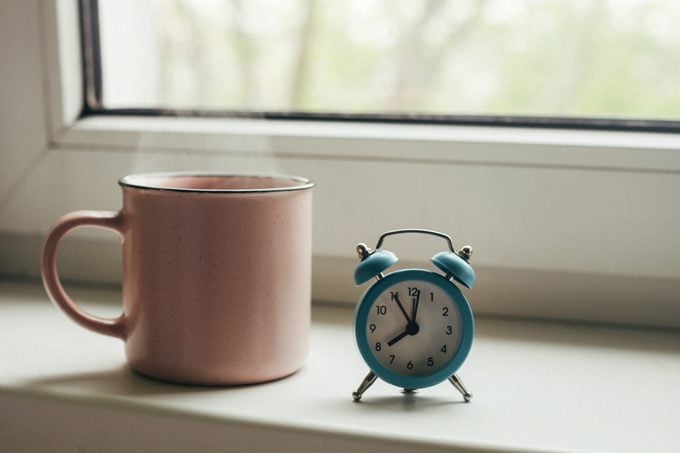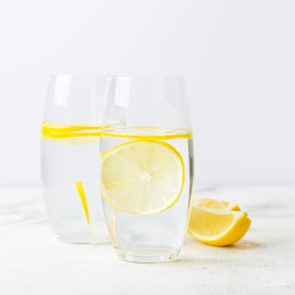Can You Drink Tea While Fasting?
Updated: Jun. 28, 2021
From matcha to herbal, here's advice from registered dietitians about whether you can drink tea while intermittent fasting.
Intermittent fasting and tea
The goal of intermittent fasting is to inspire the body to “metabolically switch,” according to a 2019 study published in The New England Journal of Medicine.
This happens when the body flips a switch, of sorts, to use energy from ketones stored in fat instead of glucose that’s stored in the liver. Some scientists believe that this increase in ketones in the blood, called ketogenesis, might trigger cellular signals to slow down the rate of aging, reduce chronic inflammation within the body, and lead to more stable blood sugar.
To cause a metabolic switch, the body generally requires 12 hours without calories, per a 2017 study in Obesity. This means zero carbs, protein, fat, and as close to zero calories as possible so that insulin isn’t produced. That means water, lemon juice-spiked water and a splash of apple cider vinegar in water are all OK during fasting windows, but how about tea?
“Unsweetened teas will not cause an insulin spike and are therefore perfectly fine to have during a fast. However, as soon as you add sugar, honey, or milk to the tea, this will break a fast,” says Autumn Bates, a certified clinical nutritionist in Manhattan Beach, California.
Plain loose tea leaves and tea bags brewed in water are acceptable to drink during fasting periods, but sweet tea, tea lattes, and any tea with caloric mix-ins—including syrup, honey, any sort of alternative dairy or cow’s milk product, sugar, or juice—are only acceptable to drink during your eating window. (Check out the complete guide to what you can drink while intermittent fasting.)
What is intermittent fasting?
This eating plan is all about the when rather than the what. So unlike diets such as Atkins (low-carb) or IIFYM (macronutrient calculating), intermittent fasting is less about the foods and drinks you choose to consume and more about the times that you do so.
The most frequently-followed intermittent fasting schedules include:
-
Time-Restricted Eating. Often deemed the easiest to follow of all of the various intermittent fasting plans, this generally takes the form of the 16:8 method, (fast for 16 hours and eat normally for the next eight hours) or the 14:10 method (fast for 14 hours and eat normally for the next 10 hours).
-
Eat Stop Eat. Fast for 24 hours once or twice a week. On the other days, eat normally.
-
Alternate-Day Fasting. Consume about 500 calories every other day, then eat normally on the alternate days.
-
5:2 Fasting. Eat normally for five days of the week and fast for two non-consecutive days (such as Monday and Wednesday).
-
The Warrior Diet. Pack all of your desired calorie consumption into a four-hour window each day.
During regular eating windows or days, there are usually no calorie or food restrictions. However, during fasting days or windows, the calorie range is often between zero and about 500 calories. You get to decide how to allocate those calories on food and/or drink.

Can you drink tea while intermittent fasting?
As previously mentioned, “unsweetened calorie-free tea is fine,” says Julie Upton, RD, co-founder of the nutrition news company Appetite for Health in San Francisco.
This includes unsweetened herbal and caffeinated varieties just as long as they don’t include creamer, cream, dairy/dairy alternative, or any source of sugar, adds Leigh Merotto, RD, a Toronto-based registered dietitian with a focus on metabolic health, digestion/gut health and sports nutrition.
The health benefits of drinking tea while intermittent fasting
Drinking tea daily while intermittent fasting (or otherwise) can result in:
-
Fewer hunger pangs. Since the body is used to having a consistent source of calories throughout the day, the cravings that arise during the initial few days, weeks, and even months for some dieters can be a challenge. A specific phenolic compound and antioxidant in tea called catechins may help reduce the production of ghrelin, a hunger-signaling hormone within the body, according to a 2016 study published in Clinical Nutrition.
-
Increased relaxation. L-theanine, an amino acid found in green and black tea, can help lower stress levels, reports a 2019 study in Nutrients. The habit of brewing a cup and holding a warm mug might help naturally calm you down, too.
-
More weight loss. A 2018 review in the journal Molecules confirmed that the polyphenols in tea—in particular green tea—could be beneficial for those aiming to lose a few pounds, thanks to the caffeine and a reaction within the gut microbiome that can trigger increased fat burning.
The best teas to brew
Any unsweetened tea is a winner during fasting or eating windows while intermittent fasting, but these varieties appear to offer the most potent payoffs:
-
Green tea
-
Black tea
-
Ginger tea
-
Oolong tea
-
Peppermint tea
Who should—and shouldn’t—intermittent fast?
Intermittent fasting benefits may include weight loss, slower aging, and lower risk for cardiovascular disease. To score these wellness wins, though, you have to be able to stick with it for the long haul—something that can be a real challenge if you can only eat for four hours each day.
Intermittent fasting isn’t for everyone and those who should steer clear include people who are pregnant, breastfeeding, have diabetes, or have a history of eating disorders or seizure disorders.
As with any eating plan, check with a dietitian or your doctor prior to embarking on an intermittent fasting plan.
The final word on intermittent fasting and drinking tea
Go ahead and go green or opt for oolong any time or day while intermittent fasting as long as you enjoy it au natural. On its own, tea brewed in water is calorie-free and antioxidant-rich and may help keep cravings at bay while increasing feelings of calmness.
For the best health benefits from tea, aim to drink 3 to 4 cups of unsweetened tea each day—fasting or otherwise. Since some scientists believe that scorching hot water can burn off some of the heart-healthy and longevity-boosting components of the tea, try to make at least half of those cups cold-brewed tea. To make it, combine loose-leaf tea (one teaspoon of leaves per eight ounces of water) in a pitcher of water. Allow the tea to infuse for at least 6 hours in the refrigerator, strain out the tea leaves and enjoy.






















